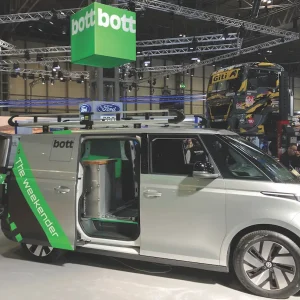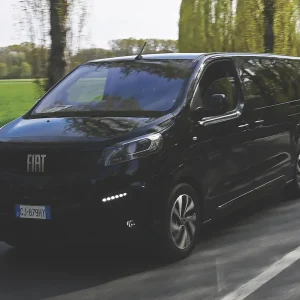 The new Doblò Cargo is now on sale. What’s been the reaction to it?
The new Doblò Cargo is now on sale. What’s been the reaction to it?
It’s been well-received by the press — some of the reviews have been very positive and we’re really pleased with them — by our dealers and by potential buyers. It’s a real breakthrough for us in terms of its fit in this particular sector of the market. The press understood very quickly the main elements that set Doblò Cargo aside from some of its competitors. I’m talking here for example about it being ready for the new and more demanding Euro 5 exhaust emission regulations and the availability of Start&Stop (it stops the engine idling unnecessarily while the vehicle is stationary in traffic, cutting fuel consumption and pollution – SB) both of which help reinforce the position of Fiat as the lowest emission-aggregated manufacturer in Europe.
What about Doblò Cargo’s capabilities as a workhorse?
None of the foregoing compromises the ability of the new Doblò Cargo to do its job. It offers more carrying capacity than the outgoing product in terms of both volume and payload and also features an innovative bi-link independent rear suspension set-up. That alone sets us apart from anybody else. So far as customers are concerned we’ve had some absolutely wonderful comments from everybody we’ve shown the vehicle to, and that’s now being reflected in significant orders placed at a much earlier stage in the game than we anticipated. Two of the orders we have already taken are substantial.
 Who are the customers?
Who are the customers?
One of them is Scottish and Southern Energy. It’s taking 610 Doblò Cargo vans as part of a total order from the Fiat group for 1,085 vehicles. The other we can’t name at present because we’re busy finalising the contract, but the company involved is taking 300 Doblòs; 150 to be delivered immediately, with the balance to be delivered later in the year and destined for use by a new venture it’s launching in the final quarter. We’re tendering for a number of other orders and we’ve got a variety of blue chip companies asking us for our terms on Doblò Cargo with the aim of substituting it for slightly larger vehicles. Scottish & Southern represents conquest business for us. We’ve been a supplier to the company for about three years — it took some 50 Ducatos from us a couple of years ago and it runs around 300 Fiorinos — but the Doblò Cargo vans it is taking replace a competitor’s products. As for the other, as yet un-named, fleet I was referring to, we’ve supplied them with vehicles before, but not into the Doblò Cargo sector, so that’s conquest business too. What’s even more exciting for us is that many of the other fleets we’re talking to will be conquests as well.
Which Doblò Cargo is proving to be the most popular to date?
So far as engines are concerned it’s the 90hp 1.3-litre diesel and so far as specifications are concerned it’s the SX rather than the base spec. That said, more and more people are asking to try the 105hp 1.6-litre, especially in the long-wheelbase Maxi with its 4.2m3 cargo area.
What’s been the reaction to the use of independent rear suspension?
I think customers initially thought that it might involve a compromise in performance somewhere along the line, but I think they’ve been pleasantly surprised. It has advantages in terms of load capacity and low loading height and so far as the ride is concerned too.
Need there be any concerns about its durability?
Obviously the vehicle has just been launched and we’re talking about new technology, so only time will tell. However the suspension was tested rigourously prior to launch and we feel that the testing we’ve done and the rigidity built into it will stand us in good stead.
 Are you concerned that Doblò Cargo will simply steal sales from Scudo?
Are you concerned that Doblò Cargo will simply steal sales from Scudo?
Doblò Cargo can cope with payloads of up to 1,000kg, so anybody who needs to carry weight, but doesn’t need cargo space, may look to downsize. If we’re honest with ourselves, however, we have to admit that our volume sales of Scudo are not so high that a percentage drop will have a seriously detrimental impact on our overall performance. Add Scudo and Doblò Cargo sales together and we’ll still have substantial growth. We’re getting a tremendous amount of interest incidentally in the Doblò Cargo platform cab as the basis for small conversions, especially from local authorities and businesses engaged in chilled distribution. There aren’t many platform cabs around of that size so we could open up an incremental stream of business for ourselves.
 Are customers moving upwards from Fiorino to Doblò Cargo?
Are customers moving upwards from Fiorino to Doblò Cargo?
It’s a bit too early to say, but that’s not something we’ve seen so far and in fact Fiorino sales are substantially up on the same period last year.
How many Doblò Cargo vans do you expect to sell this year?
We’re planning to sell in the region of 2,500, which is above our original estimate of 1,800. We’ve revised it upwards because of the response we’ve had from the market and the orders we’ve already taken. The reduction in Scudo sales — we’re down about 200 units at the moment year-on-year — is not as much as the increase in Doblò sales, so we’ll have a net gain. Some of Scudo’s sales fall is a consequence of a decline in the demand for conversions. Up until recently we’ve done very well with the Scudo Combi as a basis for taxi conversions. In the first quarter, however, this side of the business was hit quite hard and we believe that’s a consequence of self-employed and small business people finding it difficult to gain access to credit. We are, however, introducing a couple of programmes that should help Scudo recover its position.
Which model is your biggest seller?
Ducato. It takes around five per cent of its segment, it’s continuing to maintain its market share, it is the mainstay of our brand and it still dominates the motor caravan market.
 Aside from taxis, what’s happening on the special conversions front?
Aside from taxis, what’s happening on the special conversions front?
We’re getting a bit more involved in this area and we’re pursuing a slight change in approach. Some conversions, Ducato dropsides for instance, can be ordered direct from the factory. The dropside bodies are made by San Marco and fitted at a site next door to the Ducato factory at Val di Sangro in Italy. We can also source Ducato minibuses from the factory. If the conversion is more specialised then the majority of our dealers have arrangements in place with bodybuilders or in two or three cases will carry out the work themselves in-house. North East Truck & Van, for instance, has the ability to do so. The slight change I’m referring to involves operators who only run converted vehicles and have conversions carried out to their individual requirements by their own bodybuilders. We’re supplying an increasing number of chassis to businesses such as these. For example, we’ve delivered a small number of Ducatos to Petit Forestier for conversion to refrigerated vehicles.
What’s your alternative fuels offer?
In mainland Europe we have a full factory-built range of models that will run on compressed natural gas (cng) but at the moment we’re not offering them in right-hand drive because of the lack of access to cng in the UK. We could, however, potentially supply them to customers who have cng readily available. We can also offer electric versions of Fiorino and Doblò Cargo in conjunction with Micro-Vett of Italy. They’re homologated as Micro-Vett vehicles rather than Fiats.
What’s happening with the dealer network?
We’re consolidating it. Last year we had 157 dealers, but by the end of next year we’ll have 110 to 120. That will include a core network of roughly 80 dealers who will provide service to a higher level, with dedicated facilities. We’ve got 57 core dealers at present so we’re having to fill some open points; in north London and to the north of Manchester for example. We should have the former filled shortly and we’re strengthening our representation around Heathrow as well.
What other network changes are you making?
We’ve just appointed a new dealer in Oxford, we’ve changed our representation in Reading, we’re making a change in Glasgow and we appointed a new dealer in Swansea, C E M Day, at the end of last year. Most of our new core dealers are, however, being created by elevating the standards of some of our existing dealers, so we’re only having to recruit ten completely new ones. About 50 per cent of the core dealers also hold the Fiat car franchise while the remainder are truck dealers who also represent either Iveco, our sister company, or Daf. A lot of Daf dealers used to represent LDV too and they clearly need something to replace that product. Truck dealers can provide customers with extended workshop opening hours while car dealers offer the accessibility of main road sites in heavily populated areas.
Could you envisage the Fiat Professional van franchise being held by a car dealer representing a make other than a Fiat group brand?
That’s not something we would rule out if it were the correct solution for Fiat Professional. It’s not an arrangement we have in the UK at present, but we do in mainland Europe.
What do you think will happen to the van market this year?
We reckon it will reach around 205,000 units; not quite a boom, but certainly up on last year.
 In an innovative approach to marketing you’re promoting Fiat Professional by introducing Lightfoot Logistics to our screens. It’s a cleverly-crafted and very funny mini-sitcom featuring the trials and tribulations of a fictional van fleet. What prompted the move?
In an innovative approach to marketing you’re promoting Fiat Professional by introducing Lightfoot Logistics to our screens. It’s a cleverly-crafted and very funny mini-sitcom featuring the trials and tribulations of a fictional van fleet. What prompted the move?
We commissioned some research that told us that, so far as marketing is concerned, all manufacturers usually do the same thing at the same time and it’s difficult to differentiate one make from another. So we decided to try to talk to operators in a different way. Lightfoot Logistics takes a humorous approach to the, very real, trials and tribulations of fleet management and allows us to position our product in terms of being a bit of a hero in helping fleet managers get over the various daily hurdles they face. We’ve had some scepticism and we’ve had our competitors asking us why on earth we’re doing it; but we’ve had some really great reviews too.





